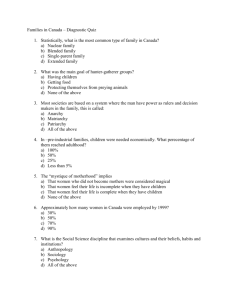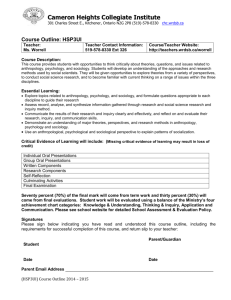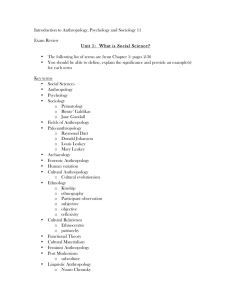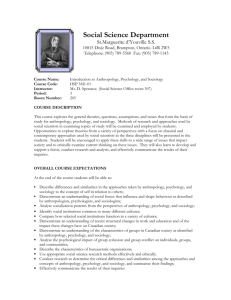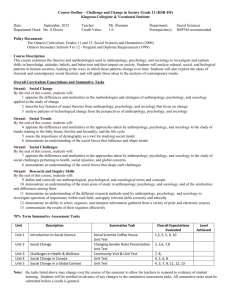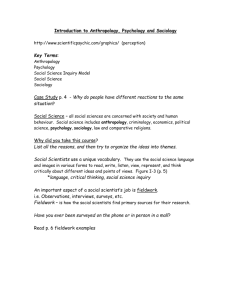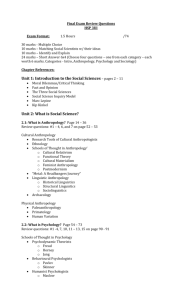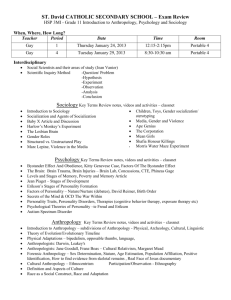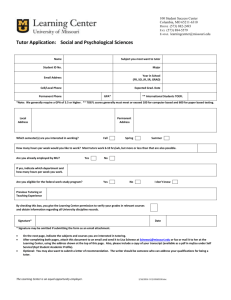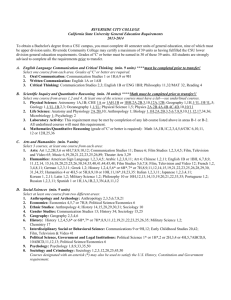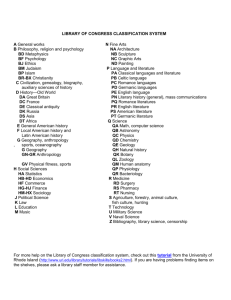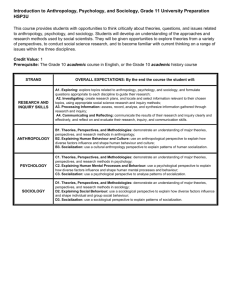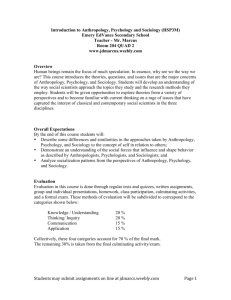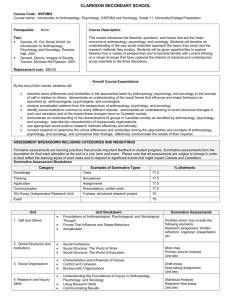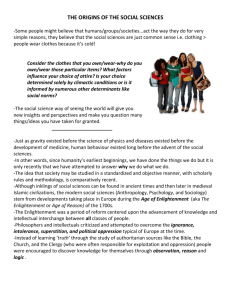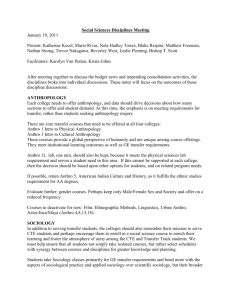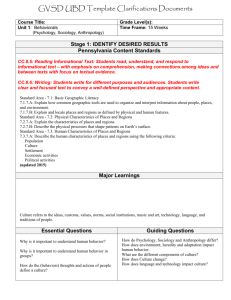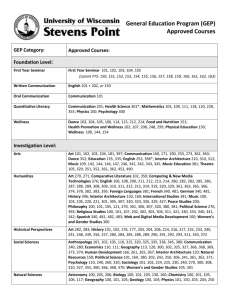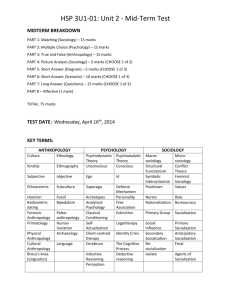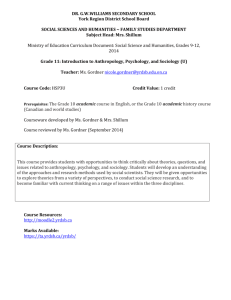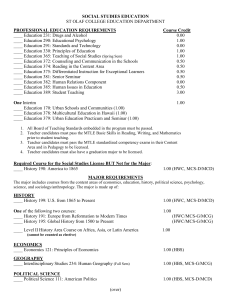HSP3M
advertisement
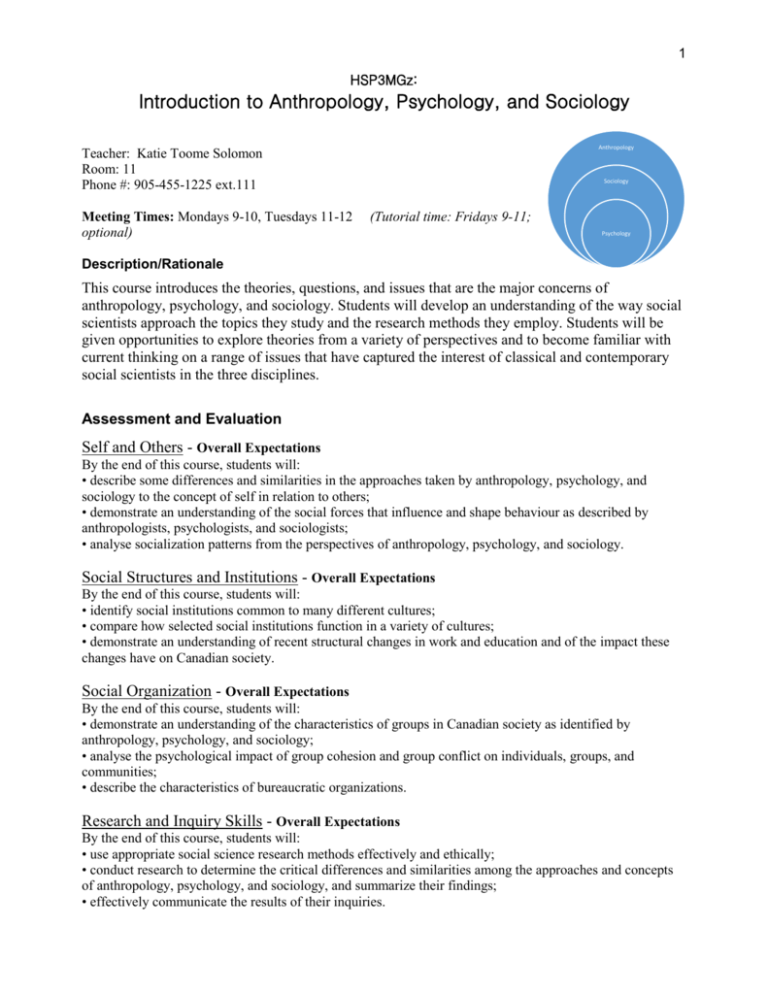
1 HSP3MGz: Introduction to Anthropology, Psychology, and Sociology Anthropology Teacher: Katie Toome Solomon Room: 11 Phone #: 905-455-1225 ext.111 Meeting Times: Mondays 9-10, Tuesdays 11-12 optional) Sociology (Tutorial time: Fridays 9-11; Psychology Description/Rationale This course introduces the theories, questions, and issues that are the major concerns of anthropology, psychology, and sociology. Students will develop an understanding of the way social scientists approach the topics they study and the research methods they employ. Students will be given opportunities to explore theories from a variety of perspectives and to become familiar with current thinking on a range of issues that have captured the interest of classical and contemporary social scientists in the three disciplines. Assessment and Evaluation Self and Others - Overall Expectations By the end of this course, students will: • describe some differences and similarities in the approaches taken by anthropology, psychology, and sociology to the concept of self in relation to others; • demonstrate an understanding of the social forces that influence and shape behaviour as described by anthropologists, psychologists, and sociologists; • analyse socialization patterns from the perspectives of anthropology, psychology, and sociology. Social Structures and Institutions - Overall Expectations By the end of this course, students will: • identify social institutions common to many different cultures; • compare how selected social institutions function in a variety of cultures; • demonstrate an understanding of recent structural changes in work and education and of the impact these changes have on Canadian society. Social Organization - Overall Expectations By the end of this course, students will: • demonstrate an understanding of the characteristics of groups in Canadian society as identified by anthropology, psychology, and sociology; • analyse the psychological impact of group cohesion and group conflict on individuals, groups, and communities; • describe the characteristics of bureaucratic organizations. Research and Inquiry Skills - Overall Expectations By the end of this course, students will: • use appropriate social science research methods effectively and ethically; • conduct research to determine the critical differences and similarities among the approaches and concepts of anthropology, psychology, and sociology, and summarize their findings; • effectively communicate the results of their inquiries. 2 Definitions in Assessment: Diagnostic: This refers to assessment activities undertaken at the beginning of a block of learning to determine student's strengths and learning needs in order to plan, modify, and adjust instruction or to provide alternative learning opportunities. Diagnostic assessment data is not used in the determination of grades. Formative: This refers to the ongoing assessment and/or evaluation during the learning process. It is used to monitor student performance and provide feedback in an effort to enhance and improve their performance on summative tasks. As well, recorded formative data may be tracked and monitored to support professional judgement in cases where the body of summative evidence provided by the student has been affected by illness, missed assignments, etc. Summative: This refers to assessment and/or evaluation that occurs at the conclusion of a block of learning for the purposes of determining the grade. Summative assessment provides the foundation for teachers' professional judgement. These assessments are reported across the four categories of the achievement chart. The assessments will be distributed across four achievement chart categories using a variety of assessment methods: Categories of Achievement Knowledge / Understanding Thinking / Inquiry Communication Application Category Description Students will develop knowledge of facts, terms, concepts, principles and theories and develop an understanding of the relationship among theories. Students will develop critical and creative thinking skills (reflecting and explaining) and research and inquiry skills (questioning). Students will develop communication of information and ideas using language, symbols and visuals and forms for different audiences and purposes. Students will practice the application of ideas and skills in familiar contexts and transfer concepts and procedures to new contexts using technology, procedures and equipment. Learning Skills: It is an expectation that each student is assessed not only on their academic achievement but also on their Learning Skills. These skills include: Working Independently, Organization, Initiative, Work Habits & Homework, Teamwork. Learning skills will not be factored into the grade for this course but will appear on the report card. It is important to remember that the development and consistent practice of these skills will influence academic achievement. Deadlines: Some deadlines are negotiable, some are absolute. If the student does not complete or submit work on either an absolute or a negotiated deadline, that work will be considered incomplete. The student should seek assistance from the teacher when unable to complete the task due to insufficient knowledge or skill. It is the responsibility of the student to negotiate an alternate deadline in circumstances when he/she is unable to complete the task on time. Mark Breakdown Term Work: 70% Final Evaluation: 30% Plagiarism “Plagiarism is the action of taking and using, as one’s own, the thoughts, writings or inventions of another. It could be an idea, design, passage or work. Plagiarism also exists if a student copies word for word. Plagiarism of ideas also exists if a student takes and uses an idea without giving proper annotation (i.e. to note the author or source of the information including the Internet). Plagiarism also extends to submitting the work of friends, peers, and/or parents as your own” (Student Handbook). Students found to have plagiarized will have to redo the assignment and may receive a mark of zero. Parent Signature Student Signature (over 18) Date
